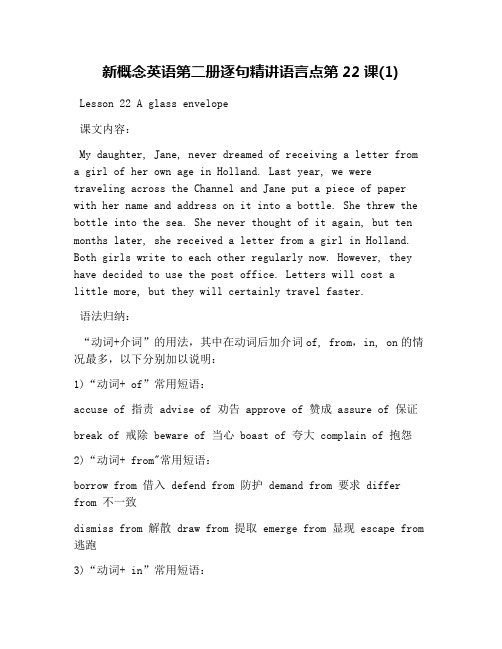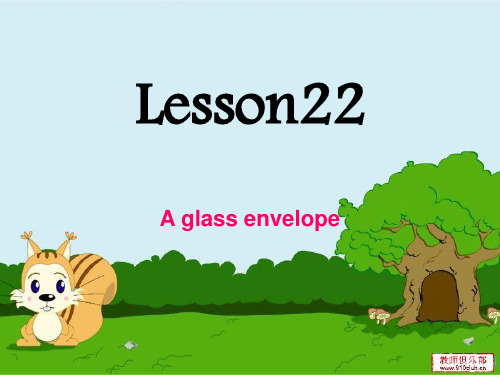22课语法讲义
《简明法语教程》22课 单词 课文 语法 ppt

Inviter qn. chez qn. 邀请某人去家里作客 Inviter qn. à faire. 邀请某人做某事 例如:Il aime bien inviter ses amis à dîner. • 他很喜欢请他的朋友吃晚饭。
• Il est en train de chercher son portable. • 他正在找他的手机。 • Il cherche à réussir son examen. 他力图
要通过考试。
简明法语教程22课
• 课文讲解
Au téléphone
• Pierre, le mari de Nicole, téléhone à Thomas. Il veut inviter Thomas et Isabelle au restaurant.
• Thomas : Salut ! Pierre. Tu vas bien ? Pierre : Ca va. Et toi, tu ne te sens pas très bien ? Thomas : Oh ! Ce n’est pas grave. Un peu fatigué, c’est tout. D’où m’appelles-tu ?
简明法语教程22课
• 1 prêter qch. à qn. 把某物借给某人 emprunter qch. à qn. 向某人借某e euros, mais il ne me les a pas encore rendu.
• 我借给他一千欧,但是他还没还给我。 J’ai emprunté un livre à la bibliothèque.
新概念英语第二册逐句精讲语言点第22课(1)

新概念英语第二册逐句精讲语言点第22课(1)Lesson 22 A glass envelope课文内容:My daughter, Jane, never dreamed of receiving a letter from a girl of her own age in Holland. Last year, we weretraveling across the Channel and Jane put a piece of paper with her name and address on it into a bottle. She threw the bottle into the sea. She never thought of it again, but ten months later, she received a letter from a girl in Holland. Both girls write to each other regularly now. However, they have decided to use the post office. Letters will cost alittle more, but they will certainly travel faster.语法归纳:“动词+介词”的用法,其中在动词后加介词of, from,in, on的情况最多,以下分别加以说明:1)“动词+ of”常用短语:accuse of 指责 advise of 劝告 approve of 赞成 assure of 保证break of 戒除 beware of 当心 boast of 夸大 complain of 抱怨2)“动词+ from"常用短语:borrow from 借入 defend from 防护 demand from 要求 differ from 不一致dismiss from 解散 draw from 提取 emerge from 显现 escape from 逃跑3)“动词+ in”常用短语:believe in 信任 delight in 喜欢 employ in 从事 encourage in鼓励engage in 忙于 experience in 体验 fail in 失败 help in 帮忙4)“动词+ on"常用短语:act on遵守 base on基于 call on拜访 comment on 评论concentrate on 集中 congratulate on 祝贺consult on 商量 count on 认为精讲笔记:1、My daughter, Jane,never dreamed of receiving a letterfrom a girl of her own age in Holland .我的女儿简从未想到过会收到荷兰的一位同龄女孩的来信!语言点1 Jane是my daughter的同位语。
新概念3精品课件lesson_22_By_heart

It is necessary ( important, natural, strange, etc) that we should clean the room every day. It was crucial that we should have done the homework.
5. 在其他场合运用 ①if only if only“如果……就好了”。 if only 表示 与现在事实相反 和 与过去事实 相反 现在事实相反,用过去时态 与过去事实相反,用过去完成时 e.g. If only you listened to me . If only you had listened to me .
4.在主语从句中应用 it is + adj. ,当形容词是advisable, critical,crucial, desirable, essential, imperative, important, incredible,, 等, 主 语从句多用虚拟语气, 现在时,v用should/would +动词原形 (should/would经常省略); 过去时,则用should/would + have done 的形式。
Lesson 22 By heart
I. Objectives
1. bl2. ceed 3. 虚拟语气
Subjunctive mood 虚拟语气
虚拟语气用来表示说话人的主观愿望 或假想,所说的是一个条件,不一定 是事实,或与事实相反。
1.在条件句中的应用 条件句: 真实条件:不用虚拟,if 是如果的意思。
1._____ to do the work, I should do it some other day. A. If were I B. I were C. Were I D. Was I 2. The volleyball match will be put off if it ___. A. will rain B. rains C. rained D. is rained
新概念二讲义 Lesson 22 学生版

Lesson 22 A glass envelope阅读理解1. How did Jane receive a letter from a stranger?Jane received a letter from a stranger by throwing a bottle with _____________________ into the sea.2. Why do they decide to use the post office to keep in contact?Because letters will certainly __________________ in spite of the higher cost.单词详解1. dream v. 做梦,梦想(_________ /__________ – __________ /__________)结构:___________________________ 梦到/梦想(做)某事翻译:我梦到环球旅行了。
______________________________________________________ n. 梦,梦想翻译:我相信有一天我的梦想会实现的。
I believe that _________________________________ someday.2. age n. 年龄词组:___________________ 在……岁时单词:ages = _________翻译:找宾馆要花掉我们好长时间。
_______________________________ to find a hotel.3. channel n. 海峡the Channel = ______________________ 英吉利海峡词义扩展:n. 频道在8频道___________________4. throw v. 扔,抛(__________ – __________)词组:________________________ 把……扔掉,丢弃词组:________________________ 从……往外扔词组:throw sb. out of employment _________课文解析1. My daughter, Jane, never dreamed of receiving a letter from a girl of her own age in Holland.●语法:receiving作介词of的_____________●结构:a girl of her own age: __________________(相关介词用法详见语法重点)●单词:Holland = ______________________●文化:AA制______________ 【思考1】白日梦,噩梦怎么说呢?【复习】用year表示年龄的两种方式?【趣味知识】大家知道电视遥控器上V ol 和Ch的标识是什么意思吗?【思考2】within a stone’s throw【趣味知识2】荷兰以风车、郁金香和宽容的社会风气而闻名,拥有欧洲第一大港鹿特丹,官方全称为the Kingdom of Netherlands,因其荷兰省最为出名,故多被称为荷兰,另一个常用俗称Dutch指的是荷兰的主要族群—荷兰人。
新概念第二册22课

2.age n.
1) 年龄,寿命,成年,法定年龄,时代
eg. You should never ask a lady’s age. eg. He bears his age well. /He carries his age well. 他不显老。 eg. He lived to a great age. 他高寿。 eg. We have a son of your age. eg. This belongs to the Bronze(青铜器) Age. 这件东西的年代属于属于青铜器时代。 come of age 达到法定成年年龄 look one’s age 看上去与真实年龄相当
2) (喻)(新闻,信息等传递的)途径,路 线,渠道;频道
the black-market channels of foreign goods 外国货的黑市渠道 proper channel 正当途径 a television channel 电视频道 eg. Let’s see what’s on the other channel, shall we? 我们看一下另一个台上演的节目,好吗?
within a stone’s throw 近在咫尺
make a nice throw 投得好 a good throw (篮球等)好球
跟of, from, in和on的动词
1、后接of的动词: accuse of(控告) approve of(赞成) assure of(让……放心) beware of(谨防) boast of/about(夸耀) complain of/about(埋怨) consist of(由……组成) convince of/about(使信服) cure of(治愈) despair of(丧失……希望)
新概念二 第22课课件

My daughter,Jane, never___________a letter from a girl of her own age in Holland. Last year,we___________the Channel and Jane put a piece of paper with her name and address on it into a bottle. She___________ the bottle___________the sea.She never___________it again, but ten months later, she received a letter from a girl in Holland.Both girls write to___________regularly now. However, they___________use the post office. Letters will cost a little more,but they will___________travel faster.
text
熟读课文:
My daughter, Jane, never dreamed of receiving a letter from a girl of her own age in Holland. Last year, we were travelling across the Channel and Jane put a piece of paper with her name and address on it into a bottle. She threw the bottle into the sea. She never thought of it again, but ten months later, she received a letter from a girl in Holland.Both girls write to each other regularly now. However. they have decided to use the post office. Letters will cost a little more, but they will certainly travel faster.
新概念英语第二册课件Lesson22(共33页)

§ Lesson 22
A glass envelope
Who is Jane?
When were they traveling across the Channel?
When did Jane receive a letter from a girl in Holland?
dream v. 做梦, 梦想 祝你做个好梦!
at the age of 4.
channel n. 海峡
channel n. 频道
throw v.扔, 抛 throw away 扔掉
如果你不喜欢钱,你可以把它扔掉。
If you don’t like money,you can throw it away.
throw up呕吐
Let’s read
I dreamed of flying in the sky. dreamed that + 句子 I dreamed that I could fly in the
sky.
age n. 年龄 at the age of 在…岁的时候 Blue四岁就开始学英语了。 Blue began to learn English
Answers 1) another 2) the other
3) other 4) other 5) the others 6) others
一旦用cost,主语一定是物
It cost me … more : 即可做形容词, 又可做
代词 : give me more 再给我一点 文中的 “more” 为代词 =
Have a good/sweet dream! 做恶梦 have a bad dream
(噩梦nightmare) 从梦中醒来
新概念英语第二册Lesson22课件

throw at /to… 朝…扔 Eg:Don’t throw stones at the dog. throw away 扔掉
New words and expressions Text & Key points Grammar
Pre-task
• What did Jane do when she and her family were travelling across the channel?
have a dream = dream a dream 做了一个 梦 eg: Have a good/sweet dream! 祝你做个 好梦!
age n. 年龄
1.年龄 at the age of 在……几岁时 Eg: I left school at the age of 18. legal age 法定年龄,成年
2.时代 information age 信息化时代 bone age 骨龄,骨骼年龄
channel n.海峡
Eg: The English Channel separates France from England. 英吉利海峡将法国与英国分开。
throw(threw,thrown) v. 扔, 抛
My name is Jane. I have never d_re_a_m__e_d__ of receiving a letter from another girl of my o_w_n__ age in Holland. Last year, I was travelling a_cr_o_s_s__ the English Channel and put a p_ie_c_e___ of paper with my name and a_d_d_re_s_s__ on it i_n_to_____ a bottle. Then I t_h_re_w___ the bottle into the sea. I never thought of it again b_u_t ___ ten months later, I received a l_et_t_e_r__ from a girl in Holland. Now we write to each other re_g_u_l_a_rl_y__ now. However, we have d_ec_i_d_e_d___ to use the post o_ff_ic_e___. Letters will c_o_st____ a little m_o_re____, but they will ce_r_t_a_in_l_y___ travel faster.
- 1、下载文档前请自行甄别文档内容的完整性,平台不提供额外的编辑、内容补充、找答案等附加服务。
- 2、"仅部分预览"的文档,不可在线预览部分如存在完整性等问题,可反馈申请退款(可完整预览的文档不适用该条件!)。
- 3、如文档侵犯您的权益,请联系客服反馈,我们会尽快为您处理(人工客服工作时间:9:00-18:30)。
综合日语第二册第22课语法讲义
标签:日语讲义第二册助词料理分类:综合日语下册语法讲义2007-07-27 10:27 1.なんて
凸显助词,口语中用于提出主题。
①表示感叹(对事物的评价)
○ 海外旅行なんて羨ましいですね。
○ 一年ぐらいで、こんなに日本語が話せるなんて、
すごいですね。
②表示轻蔑、责备。
○ 論文を書くなんてつまらない。
○ あなたなんて大嫌い。
○ あの人の言うことなんて誰も信じないよ。
○ 私は映画なんて少しもおもしろいと思わない。
○ 歌なんて男一生の仕事ではないよ。
○ インターネットで購入するなんて大丈夫かな。
③表意外
○ みんなには時間に気をつけてなんて言ったけど、そう言った本人が遅刻してしまった。
☆なんて、など的使い分け
両者同为凸显助词,在大多数情况下可以互换。
但なんて不能用于格助词前。
○ 友達、両親になんて相談する必要はない。
○ 悩むとき、経験豊かな友達、両親などに相談したら
どうですか.
2.たら
たら语意汉语意思例句
主句是过去时表示时间的先后一…就
図書館に行ったら、友達に会った。
(发现)
主句是一般时态表示条件要是…就時間があったら行く。
接続:
Vて形+たら、A(語幹)+かったら
Naだったら、Nだったら
甲たら乙
①.“如果”=もし《甲が先(前)、乙が後》
○ お金があったら、働かないで遊んでいるだろう。
○ もし優勝できたら、お祝いに車を買ってあげよう。
○ 分からないところがあったら、先生に聞いてください。
○ 気分が悪かったら、帰ったほうがいい。
○ あまり高かったら、誰も買わないよ。
②“之后、之时”=~たとき/~てから/~たあと
○ もし雨が降ったら、道が混雑するでしょう。
○ 20才になったら、タバコを吸ってもいいです。
○ 東京に来たら、知らせてください。
○ 電車に乗ったら、たばこをやめてください。
○A:「国へ帰ったら、手紙を書きますよ。
」B:「楽しみに待っています。
」
③たら前面为虚拟的不可能的假定(若是)
○私が鳥だったら、一日中空を飛び回りたい。
④建議=たらどうですか
○もっとゆっくり食事をしたら。
○風邪ですか。
じゃ、薬を飲んで寝たらどう。
3.Vてみる(试着做某事)
○自分で料理を作ってみる。
○できるかどうか分かりませんが、やってみる。
○昨日、最近話題になっている店へ行ってみた。
○もう一度やってみてください。
○ これ、食べてみてください。
○ 先生に聞いてみてください。
○ 一度フランス料理が食べてみたい。
○ 決める前に、友達の意見を聞いてみようと思う。
○ よく読んでみると、分かった。
●自分で______てください。
☆把「てみる」和「たら」连在一起使用时构成てみたら……时可以表示建議。
(试着……如何?)
○ もう一度あって話してみたらどうですか。
○ 両親に相談してみたら。
○食べてみたら。
4.そうだ(听说,据说)
接続:
V(簡体)+そうだ→行くそうだ、行ったそうだ
A+そうだ→暑いそうだ
Naだ+そうだ→静かだそうだ
Nだ+そうだ→雨だそうだ
否定型:V、A、Na+ないそうだ
○ 今日のパーティー、王さんも来るそうだ。
○ 昔はこのあたりは川だったそうだ。
○ 今年の冬は暖かいそうだ。
○ あの店はいつも静かだそうだ。
○ あの人は留学生ではなく、先生だそうだ。
★表示传闻的根据时可以用「によると」、「では」来提示。
○ 話によると、二人は結婚したそうだ。
○ 天気予報では、明日は雨が降るそうだ。
●話によると明日は_____そうだ。
#######
1ために/ためのN(表目的、为了做某事而……)
接続:(Vる/Nの)ために
(Vる/Nの)ためのN
○ 家族のために働く。
○ 家を買うために、朝から晩まで働く
○ 日本語を研究するための資料を調べている。
○ 日本語を習うためにたくさんの時間がかかった。
2.ために(表原因、因為~)
接続:V?N?A?Naの連体形
○ 雨のために、運動会を中止した。
○ 事故のために道が込んでいる。
○ 疲れたため、三日間も休んだ。
○ 暑さのために、クーラーを購入した。
3.ように(表目的)
接続:Vるように
Vないように
○ 忘れないようにメモをする。
○ 子供でも読めるように名前に平仮名をつけた。
○ 合格するようにしっかり勉強した。
○ 旅行に行けるように貯金している。
★ように?ためにの使い分け
①ように前面为表状态的动词
ために前面为表意志的动词。
●後ろの人にも聞こえるように、大きな声で話してください。
(为了实现让后面的人也能听见这个状态请大声点。
)
● 中国語を勉強するために、中国へ留学した。
(为了实现学习汉语这个意愿/意志,去中国留学了)
②ために的前后一定是同一主语、
ように则没有这个规定。
● 高橋は中国語を勉強するために、中国へ留学した。
(前后主语都是高桥)
● 後ろの人にも聞こえるように、大きな声で話してください。
(前句主语是坐在后面的人,后句主语是听话人)
③有“ためのN”的形式,没有的“ようのN”形式。
4.どんなに~ても、いくら~ても(让步条件)
即使……也,不管……也(可比照P88学习)
○ 会話はいくら聞いてもわからない。
○ どんなに大きな地震があっても、この建物なら大丈夫だ。
○ どんなに難しい問題でもできる。
5.どんなに~でしょう(感嘆、多么……啊!)
○ 成功できたら、どんなにいいでしょう。
○ 王さんは知ったら、どんなに喜ぶことでしょう。
○ あの時のお母さんはどんなに奇麗な人でしょう。
6.について/についての
○ 事故の原因について調べている。
○ 事故の原因についての説明を聞いた。
○ この点について賛成できない。
○ 日本についての文章を書いた。
○ 手紙についてのマナーを学ぶ。
○ 文法についての質問
○ 日本史についての研究
7.动词的自动态(不禁让人想起,感到,怀念……)
考えられる?思われる?感じられる?思いだされる?信じられる、待たれる?案じられる?偲ばれる
①外国にいる娘のことが案じられる。
②月を見ていると,国のことが思い出されます。
③話を聞いているうちに,自分がたいへん悪いことをしたように感じられます。
④彼が犯人だと思われた。
我(很自然地)认为他就是犯人。
⑤あなたからの手紙が何よりも待たれます。
我由衷地盼着你的来信。
8.こと(把句子成分变为名詞性的)
○ どんな料理を作ることが多いですか。
○ 今日は学校を休むことにする。
○ 書くことが考えることだ。
○ 日本では「高校」は「高級中学」のことだ。
